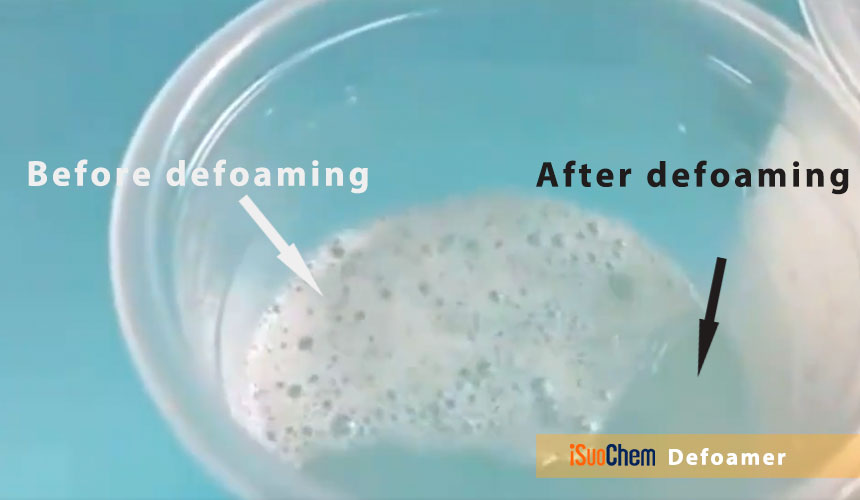The Role of Defoamers in Enhancing Product Quality and Efficiency
In different manufacturing procedures, the presence of foam can significantly impede item top quality and functional effectiveness. Defoamers act as vital ingredients that minimize this problem, guaranteeing smoother manufacturing process while boosting the visual and practical characteristics of the final products (defoamers). Their application covers a multitude of markets, from food and drink to pharmaceuticals, where uniformity and reliability are extremely important. However, the option of the ideal defoamer can be essential to accomplishing optimum results, increasing crucial questions regarding solution compatibility and performance metrics that merit additional exploration.
Recognizing Defoamers
Understanding the role of defoamers is important for preserving item top quality throughout numerous sectors. Defoamers are chemical ingredients created to prevent the development and reduce of foam in liquid systems, which can adversely influence procedures such as blending, filling up, and surface area stress. Frothing can cause ineffectiveness, product flaws, and compromised visual allure, making defoamers a crucial component in manufacturing operations.
In industrial applications, defoamers aid to boost product consistency and stability. For instance, in the paint and coatings sector, foam can disrupt the application process and the final coating. In food and drink production, excessive foam can prevent bottling and packaging performance. The efficient use defoamers not just makes sure smoother production procedures but additionally adds to exceptional item performance.
Additionally, the choice and solution of a defoamer should straighten with particular application demands, such as compatibility with other active ingredients, effectiveness under differing temperature level and pH problems, and prospective governing constraints. Eventually, recognizing defoamers' features and their value in numerous formulations is critical for optimizing manufacturing and making certain the greatest top quality final product.
Types of Defoamers
Defoamers can be categorized right into several types based on their make-up and device of action. The key types include silicone-based, non-silicone organic, and not natural defoamers.
Silicone-based defoamers are among the most effective, mostly as a result of their ability to spread rapidly on the fluid surface area and disrupt foam formation. Their one-of-a-kind chemical structure enables for premium security, making them ideal for high-temperature applications and atmospheres with differing pH degrees.
Non-silicone natural defoamers, frequently composed of natural oils or fats, are valued for their biodegradability and lower toxicity. These are usually utilized in food and beverage applications where safety and ecological effect are extremely important.
Inorganic defoamers, which include compounds like talc or calcium carbonate, act by enhancing the density of the liquid, consequently minimizing foam security. They are commonly used in industrial procedures where compatibility with various other products is not a worry.
Each kind of defoamer has unique advantages and limitations, enabling for tailored services relying on the specific foaming concerns run into in various applications. Understanding these distinctions is essential for optimizing efficiency and attaining wanted product quality.
Applications Throughout Industries
Many markets take advantage of defoamers to enhance item high quality and operational performance. In the food and drink industry, defoamers are essential in procedures such as brewing and dairy products production to stop foam development, which can result in inefficiencies and item variance. By controlling foam, suppliers can make sure better return and a more consistent product.
In the pharmaceutical sector, defoamers play an important duty in the formula of liquid drugs, where excessive foam can hamper mixing and exact dosing. Their usage helps preserve the integrity of the formulas and helps with smoother manufacturing processes.
The paint and finishes industry likewise relies upon defoamers to enhance the performance of items during Going Here application. By lessening foam, these ingredients ensure a smoother surface and boost the visual high qualities of the end product.

Advantages of Making Use Of Defoamers
While the application of defoamers differs throughout sectors, their advantages constantly improve product high quality and process efficiency. One significant benefit is the decrease of foam development throughout producing processes, which can or else bring about production delays and variances in product quality. By decreasing foam, defoamers make it possible for a smoother circulation of materials, facilitating more effective operations and minimizing the chance of devices breakdowns.
In addition, making use of defoamers can enhance the look and structure of last items. In markets such as finishings, paints, and food processing, too much foam can jeopardize the visual looks and general quality, while the ideal defoamer application guarantees an uniform finish and preferable qualities. Furthermore, defoamers can add to cost financial savings by lowering waste during manufacturing and enhancing making use of basic materials (defoamers).

Selecting the Right Defoamer
Selecting the appropriate defoamer is vital for maximizing manufacturing procedures and ensuring product high quality. The choice of defoamer influences not just the performance of foam control however likewise the general efficiency attributes of the last product. Factors to consider include the kind of application, the chemistry of the solution, and the environmental conditions under which the product will certainly be utilized.
Different sectors might require details defoamer kinds, such as silicone-based, organic, or polymeric defoamers. Understanding the compatibility of the defoamer with the primary ingredients is necessary to stay clear of damaging reactions that could jeopardize item stability. Furthermore, the defoamer's effectiveness in various temperatures and pH degrees need to be assessed to ensure constant efficiency.
Examining the defoamer in small-scale applications can give important insights right into its performance and viability. Consideration of regulative conformity, other specifically in food, pharmaceuticals, and cosmetics, is extremely important in selecting a defoamer. Eventually, an extensive analysis of these factors will result in the selection of a defoamer that not only regulates foam effectively but likewise improves the quality and efficiency of the end product.
Conclusion

To conclude, defoamers are essential additives that considerably enhance product high quality and efficiency throughout numerous sectors. By effectively reducing foam formation, these agents not only enhance operational efficiency yet additionally add to the visual and useful honesty of items. The strategic selection and application of defoamers lead to cost financial savings, enhanced source use, and boosted client fulfillment. Generally, the significance of defoamers in commercial procedures can not be overemphasized, as they play a crucial function in accomplishing top notch and constant outcomes.
Frothing can lead to ineffectiveness, product problems, and compromised visual charm, making defoamers a vital component in making operations.
